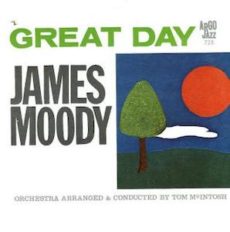
The Quarantined Jazz Voyager
Once again the Jazz Voyager selects another rare gem from the stacks in his library and dusting it off places it on the turntable for another listen. This week it is an album by James Moody titled Great Day. The album was recorded on two simultaneous sessions, June 17 -18, 1963 at the Nola Penthouse Studio in New York City, produced by Esmond Edwards and released the same year on the Argo Records label.
The saxophone and flute work from Moody is always reliable and excellent for the avid listener. He has a penchant for switching from soul jazz to hard bop to mainstream, as he plays straight-ahead originals, standards, and ballads.
Benny Golson wrote the liner notes, Don Bronstein designed the cover and Esmond Edwards painted the cover art. The Great Day sessions historical significance is it is the first documented encounter for Thad Jones and Mel Lewis, who would go on to lead the Thad Jones~Mel Lewis Orchestra.
Tracks | 33:06 All compositions by Tom McIntosh, except as indicated- Great Day ~ 4:00
- The Search ~ 4:35
- Let’s Try ~ 3:22
- One Never Knows (John Lewis) ~ 5:18
- Opales’que (Dennis Sandole) ~ 5:01
- Blues Impromptu (James Moody) ~ 5:30
- Malice Toward None ~ 5:20
- James Moody ~ alto saxophone, tenor saxophone, flute
- Johnny Coles, Thad Jones ~ trumpet
- Hubert Laws ~ flute
- Hank Jones, Bernie Leighton ~ piano
- Jim Hall ~ guitar
- Richard Davis ~ bass
- Mel Lewis ~ drums
- Tom McIntosh ~ arranger, conductor, composer
More Posts: adventure,album,club,flute,genius,jazz,museum,music,preserving,restaurant,saxophone,travel
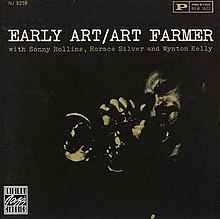
The Quarantined Jazz Voyager
The Jazz Voyager has selected from the shelves in his library and dusted off an album by Art Farmer recorded in 1962 titled Early Art. The album features two sessions recorded in 1954 which was originally released on LP on the New Jazz label in 1962.
The album was produced by Bob Weinstock and recorded at Van Gelder Studio in Hackensack, New Jersey on January 20 (tracks 1-3, 5) and November 9 (tracks 4, 6-10). The cover design and photography was by Don Schlitten and the liner notes were written by Joe Goldberg.
The programming differs from what is listed, with Soft Shoe (which should have been the opener) is actually appearing fifth and the songs listed as appearing second through fifth have moved up to first through fourth. The Jazz Voyager is pleased to present this work by Farmer and is still practicing social distancing and wearing his mask.
Tracks | 41:52 All compositions by Art Farmer except as indicated- Confab in Tempo ~ 3:54
- I’ll Take Romance (Oscar Hammerstein II, Ben Oakland) ~ 4:57
- Wisteria ~ 4:32
- Autumn Nocturne (Kim Gannon, Josef Myrow) ~ 4:05
- Soft Shoe ~ 4:59
- I’ve Never Been in Love Before (Frank Loesser) ~ 3:49
- I’ll Walk Alone (Jule Styne, Sammy Cahn) ~ 3:55
- Gone With the Wind (Herbert Magidson, Allie Wrubel) ~ 4:07
- Alone Together (Arthur Schwartz, Howard Dietz) ~ 3:59
- Pre Amp ~ 3:35
- Art Farmer ~ trumpet
- Sonny Rollins ~ tenor saxophone (tracks 1-3,5)
- Horace Silver (tracks 1-3, 5), Wynton Kelly (tracks 4, 6-10) ~ piano
- Percy Heath (tracks 1-3, 5), Addison Farmer (tracks 4, 6-10) ~ bass
- Kenny Clarke (tracks 1-3, 5), Herbie Lovelle (tracks 4, 6-10) ~ drums
More Posts: adventure,album,club,genius,jazz,museum,music,preserving,restaurant,travel,trumpet
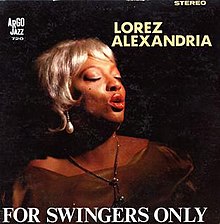
The Quarantined Jazz Voyager
The Jazz Voyager has been combing the stacks of music in his library for the right album and has selected For Swingers Only by vocalist Lorez Alexandria that was released by the Argo label in 1963.
A stylized, disciplined, soulful, and satisfying session, the recording of this album took place over two days on January 2 & 3, 1963 at Ter Mar Recording Studios in Chicago, Illinois. The session was produced by Esmond Edwards.
Tracks | 29:00- Baltimore Oriole (Hoagy Carmichael, Paul Francis Webster) ~ 3:11
- Little Girl Blue (Richard Rodgers, Lorenz Hart) ~ 3:34
- All or Nothing at All (Arthur Altman, Jack Lawrence) ~ 4:55
- Traveling Down a Lonely Road (Nino Rota, Michele Galdieri, Don Raye) ~ 3:45
- Mother Earth (Peter Chatman) ~ 3:03
- Love Look Away (Richard Rodgers, Oscar Hammerstein II) ~ 3:49
- The End of a Love Affair (Edward C. Redding) ~ 2:49
- That Old Devil Called Love (Alan Roberts, Doris Fisher) ~ 3:54
- Lorez Alexandria – vocals
- Ronald Wilson – tenor saxophone, flute
- John Young – piano, arranger
- George Eskridge – guitar
- Jimmy Garrison – bass
- Phil Thomas – drums
- Cover Design ~ Don Bronstein
- Cover Photography ~ Roger Marshutz
- Engineer ~ Eddie Rio
- Liner Notes ~ Leonard Feather
More Posts: adventure,album,club,genius,jazz,museum,music,preserving,restaurant,travel,vocal
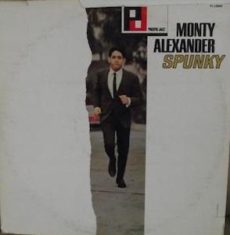
The Quarantined Jazz Voyager
If you don’t know what to do by now to keep yourself and your family safe and healthy, there’s nothing else I can say to change your perspective. So, with that said, this week the Jazz Voyager is pulling from the stacks a 1965 hard bop studio album titled Spunky released by Monty Alexander. The session was produced by Richard Bock and recorded at World Pacific Studios in Los Angeles, California and Plaza Sound Studios in New York the year of its release. It was offered on Pacific Jazz LP record ST-20094 in stereo and PJ-10094 in mono.
- Monty Alexander: piano (all tracks)
- Victor Gaskin: bass (all but 4, 6)
- Bob Cranshaw: bass (tracks 4, 6)
- Paul Humphrey: drums (all but 4, 6)
- Bruno Carr: drums (tracks 4, 6)
- Gene Bertoncini: guitar (tracks 4, 6)
- Scott Turner: guitar (track 9)
- Cover design by Woody Woodward
- Cover Photography by Les McCann
- Back Cover Photography by Eddie Rio
- Liner Notes written by Paul Compton
- Spunky (Monty Alexander) ~ 2:39
- Naturally (Nat Adderley) ~ 3:35
- Jamaica Shake (Monty Alexander) ~ 2:25
- Heart Strings (Milt Jackson) ~ 3:33
- Taggie’s Tune (Junior Mance) ~ 4:14
- Rattlesnake (Monty Alexander) ~ 2:30
- Whisper Not ( Benny Golson) ~ 3:58
- I’m An Old Cowhand (Johnny Mercer) ~ 2:32
- Little Children Of Peru (Scott Turner) ~ 2:50
- Spirit Of Foo (Monty Alexander) ~ 4:45
- Monty Alexander: piano (all tracks)
- Victor Gaskin: bass (all but 4, 6)
- Bob Cranshaw: bass (tracks 4, 6)
- Paul Humphrey: drums (all but 4, 6)
- Bruno Carr: drums (tracks 4, 6)
- Gene Bertoncini: guitar (tracks 4, 6)
- Scott Turner: guitar (track 9)
- Cover design by Woody Woodward
- Cover Photography by Les McCann
- Back Cover Photography by Eddie Rio
- Liner Notes written by Paul Compton
Tracks | 33:10
- Spunky (Monty Alexander) ~ 2:39
- Naturally (Nat Adderley) ~ 3:35
- Jamaica Shake (Monty Alexander) ~ 2:25
- Heart Strings (Milt Jackson) ~ 3:33
- Taggie’s Tune (Junior Mance) ~ 4:14
- Rattlesnake (Monty Alexander) ~ 2:30
- Whisper Not ( Benny Golson) ~ 3:58
- I’m An Old Cowhand (Johnny Mercer) ~ 2:32
- Little Children Of Peru (Scott Turner) ~ 2:50
- Spirit Of Foo (Monty Alexander) ~ 4:45
- Monty Alexander: piano (all tracks)
- Victor Gaskin: bass (all but 4, 6)
- Bob Cranshaw: bass (tracks 4, 6)
- Paul Humphrey: drums (all but 4, 6)
- Bruno Carr: drums (tracks 4, 6)
- Gene Bertoncini: guitar (tracks 4, 6)
- Scott Turner: guitar (track 9)
- Cover design by Woody Woodward
- Cover Photography by Les McCann
- Back Cover Photography by Eddie Rio
- Liner Notes written by Paul Compton
More Posts: adventure,album,club,genius,jazz,museum,music,piano,preserving,restaurant,travel
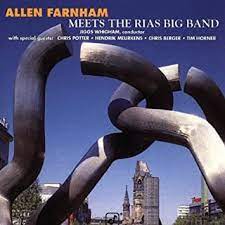
Daily Dose Of Jazz…
Allen Nicholas Farnham was born May 19, 1961 in Boston, Massachusetts and first played piano when he was 12. In 1983 he graduated from the Oberlin Conservatory of Music in Ohio.
Moving to New York City in the following year Allen freelanced before signing with Concord Records in 1986. Between 1986 and 1990 he led his own quartet, with either Joe Lovano or Dick Oatts on saxophone and Drew Gress and Jamey Haddad filling out the rhythm section and from 1990 he was pianist and music director for Susannah McCorkle.
He has produced more than fifty albums, is on the faculty of New Jersey City University and has recorded several albums under his own name. Pianist, record producer, educator, composer and arranger Allen Farnham continues to pursue all his musical endeavors.
More Posts: arranger,bandleader,composer,history,instrumental,jazz,music,piano,record producer



